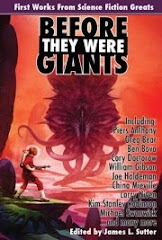The one—and only—bad thing about publishing
Farmerphile: the Magazine of Philip José Farmer is how much it cut into my reading time. I announced the rebirth of
Farmerphile as an Annual anthology a little over a week ago and it's already having a similar affect. Of course with the first issue being due out in June, just four short months away, it's almost as if we're back to doing a quarterly magazine.
I also started my attempt at relearning computer programing in earnest this week. So far this is going well, it but it is a another time eater. Which is why I was up until 2:00am last night finishing
Tales of the Shadowmen 6. Ok, I would have been to sleep by 1:00 if I hadn't found Pearl Jam's performance on Austin City Limits
online here. I had to watch that last night. Since then I've listened to it twice while doing other things; in fact I'm listening to it right now.
As I said in a previous post, Black Coat Press'
Tales of the Shadowmen series somehow gets better with each book. Even though this volume has this awesomely
creepy cover and the theme
Grand Guignol, "is dedicated to simpler horrors and theatrical villainy," the book contains little "horror." I won't describe all the stories in this excellent collection, but here are some of the high points.
It starts with Christopher Paul Carey's first solo effort in a Shadowmen collection, "Caesar's Children," which at it's core is an astoundingly original idea. You know all those Utopian novels written by Thomas More, Jules Verne, H.G. Wells, Edward Bellamy, Ignatius Donnelly, Jack London, etc.? What if they all came to fruition, at the same time, spread out in separate city-states all over the world? My utopian society is better than your utopian society, that's better than my religion is better than your religion.
Win Scott Eckert's story "Is He in Hell?" is the first in a series of stories filling in the "numerous gaps in the secret history of Wold Newton..." and features The Scarlet Pimpernel! If that doesn't pique your interest, you can turn in your WNMS badge at the door.
Matthew Baugh & Micah Harris teamed up for the wildly entertaining story "The Scorpion and the Fox." This story tells of the same shared adventure from two very different points of view, those of Rakhmetov and Becky Sharp. Ms. Sharp was the more interesting character, so much so I'd like to read more of her.
"The Treasure of Ubasti" by Travis Hiltz was my favorite cross-over story, with Mowgli meeting the unadventurous Dr. Henry Jones.
John Peel's "The Biggest Guns" would have been my favorite story in this collection. It is also a story, I think it is safe to say, Philip José Farmer would have gotten a kick out of. But, there are major continuity issues with the story, especially the ending. The ending is so wrong based on previous published accounts, that this story loses all it's credibility. A shame really.
Dennis E. Power's "No Good Deed..." is another favorite in this volume. As is often the case, I'm not familiar enough with most of these French characters, so I don't get much of the deeper significance of what is going on during the story. But the "reveal" at the end of this one was the biggest surprise in the book. It certainly put the biggest smile on my face.
David L. Vineyard's "The Children's Crusade" is a fun story for those of us who enjoy tales of espionage, scams, stings, and other trickery. I could see the twist at the end coming, but not all of it.
Really there is too much to talk about in this book with nearly every story being well worth reading. The volume is closed out with the fifth installment in Brian Stableford's alternate history tale where the dead can come back to life. But not really in a scary way.

